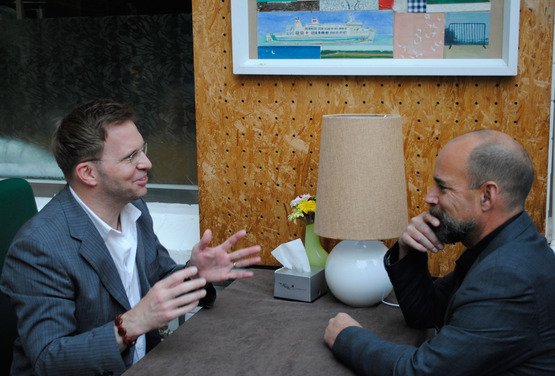
News . Feature Stories . Animation Executive Reflects on CIA Days
News
October 31, 2012
Animation Executive Reflects on CIA Days
Christopher Whittey, CIA's vice president of faculty affairs and chief academic officer, recently visited China and had a chance to speak with CIA alum, Kevin Geiger, who has turned his creative energies into a highly successful career in animation.

Christopher Whittey, CIA's vice president of faculty affairs and chief academic officer, recently visited China and had a chance to speak with CIA alum, Kevin Geiger. Kevin graduated in 1989 with a degree in painting and since then has turned his creative energies into a highly successful career in animation. He spent 12 years at Disney Feature Animation, joining the company to create digital characters for the groundbreaking "Steadfast Tin Soldier" segment of Fantasia/2000. Kevin progressed at Disney to eventually become computer graphics supervisor overseeing 3D asset production and the animation pipeline on the feature animated films Chicken Little and Rapunzel. From Disney, he took the leap into independent filmmaking and is now CEO and president of Beijing-based Magic Dumpling Entertainment, an animation transmedia company that creates character-driven, story-based transmedia entertainment for family audiences in China and around the world.
Chris: How did you come to decide to be a professional artist and attend CIA?
Kevin: Growing up in Ohio, I dreamed of being an artist or a scientist. My eventual career in animation proved a hybrid of both. As a kid I loved reading, drawing, making comics, creating puppet shows and participating in role-playing games. My parents encouraged my interests, but were a bit concerned when I decided to pursue the arts as a career. My guidance counselors at St. Ignatius High School were more than concerned, and did their level best to convince me to enroll in Yale, Harvard or Stanford instead of the Cleveland Institute of Art. But Saturday Young Artists classes at the Institute set me on my path, and I was accepted to the CIA on a portfolio scholarship in 1984.
Chris: What do you remember most about your studies at CIA? Can you tell me a little about a faculty mentor with whom you worked and what you took away from that relationship?
Kevin: I had a blast at CIA. One of the favorite 5-year periods in my life (this is back when CIA was a 5-year program). My studies were a great combination of structure and flexibility. In fact, I always felt more like a practicing artist than a student. Many of my teachers made an impression on me. At the risk of singling out some over others, I'll give shout-outs to: Gary Schumer (the nicest "tough" teacher I ever met, who encouraged me to apply to the school), Richard Fiorelli (who taught me the meaning of conceptual rigor and is the only teacher to make me cry when I tried to "phone in" a project), Gerry Vandevier (my painting advisor, who taught me to grow as a thinking-man's artist), Ken Dingwall (who shook up the painting department as our new chair), Catherine Redmond (who worked in a completely different aesthetic than myself and questioned everything I did), Julian Stanczak (painting legend and gentle soul with a steely mind and a penetrating eye) and Allen Zimmerman (who expanded my philosophy).
Chris: Over the course of your career, what have you found to be the most important skills that practicing animators, artists and designers need to be successful? To be happy?
Kevin: I left the CIA with visual and conceptual skills that have served me well across an unanticipated spectrum of creative endeavors. Analytical skills, brainstorming skills, visualization skills, improvisational skills and entrepreneurial skills are all very important, and I continue to acquire and hone these. The key to happiness (for me) is to keep learning and growing. Whenever you feel constrained or boxed-in, you are usually complicit in some way.
Chris: I know you've taken a few chances in your life, Kevin. What advice do you have for young artists and designers about stepping on thin ice and taking professional chances?
Kevin: At the risk of sounding cliche, the biggest risk in life is to avoid taking one. I once came across a quote that read: 'I came into this world naked, so what do I have to lose?' Those truly are words to live by. And taking risks is very different from being reckless. Every great opportunity or game-changer that has ever come my way did so as the consequence of a chance I took. Be bold, and don't get old before your time.
Latest Headlines view all
-
April 02, 2024
Cleveland Institute of Art students partner with Progressive Art Collection to exhibit Ready, Set, Relay! -
March 04, 2024
Cleveland Institute of Art announces Curlee Raven Holton Inclusion Scholar Program -
November 06, 2023
Collision of art and artificial intelligence creates murky waters for artists, curators and educators
Questions?
For more information about this or other CIA news, contact us here.
Social Feed